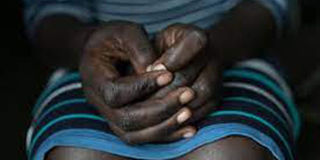Know the signs and forms of child abuse

Some victims of abuse often get stigmatised. PHOTO/FILE
What you need to know:
- Johnson Obic says: Child abuse and any other forms of violence can be reported by anyone through the national child help toll-free telephone service line 116.
This year’s theme for Day of the African Child was “30 years after the adoption of the Charter: Accelerate Implementation of Agenda 2040 for an Africa Fit for Children”. The goal of this agenda is that by 2040, the rights of Africa’s children should be firmly protected.
Aspiration nine of this agenda states that every child should be free from the impact of armed conflicts and other disasters or emergencies.
With the second wave of Covid 19 and the enforcement of the lockdown and restrictions by government to minimise the spread of the virus, we expect even more children to be abused, neglected and/sexually exploited.
As parents/caregivers of children, we form the first rings of responsibility in enhancing and promoting the protection of our children. We are critical in ensuring that by 2040, we have an Africa Fit for Children. It is important for parents to know signs and forms of abuses, to monitor and act quickly to prevent abuse and if a child has been abused that they get appropriate health care.
Abuse exists in various forms for instance, physical abuse, which is the use of force by another person to cause actual or physical injury or suffering to a child. Children can also be emotionally abused, humiliated, degraded, or intimidated.
Sexual abuse: The use of a child in a sexual act by another person. This could also include a person grooming child with intentions of establishing a sexual relationship. Neglect and negligent treatment, which is the persistent failure to meet a child’s basic, physical and or psychological needs.
Children facing these kinds of abuses often tend to isolate or withdraw from others or adults. They do not open or freely communicate because of fear. They look unhealthy and malnourished, some have scars, wounds, or physical bruises on their bodies.
They may be reluctant to say something because they may want to protect that person or are afraid of what the abuser will do if they speak up.
An article published by WebMD, one of the top health care websites, says other signs of sexual abuse present as children avoiding any kind of touch or physical contact even by those closest to them, they seem to always be on high alert, wear clothing that do not match the weather, such as long sleeves on hot days to cover up bruises; avoiding a certain person for no clear reason; have bruises, itches or bleeding around the genitals; that might cause difficulty in walking or sitting and could result in pregnancy or Sexually Transmitted Diseases (STDs) especially for children under 14 years of age.
A child may also refuse to change clothes in front of others; running away from home, constant worry about doing something wrong; depression and low self-esteem; extreme behaviour, such as being way too obedient or way too demanding; headaches and stomach upsets, with no clear cause among other indicators.
It is important for parents to discuss forms of abuse with children and encourage them to openly and freely report such issues.
Child abuse and any other forms of violence can be reported by anyone through the national child help toll-free telephone service line 116.
The government of Uganda has provided good legal frameworks and environment to protect the children. Children, parents, and community members should report any suspected abuse to their local leaders, community development or probation officers, health workers or the police so that children are supported to get the help they need in a timely manner.
Johnson Obic, Child Protection Manager ChildFund Uganda




